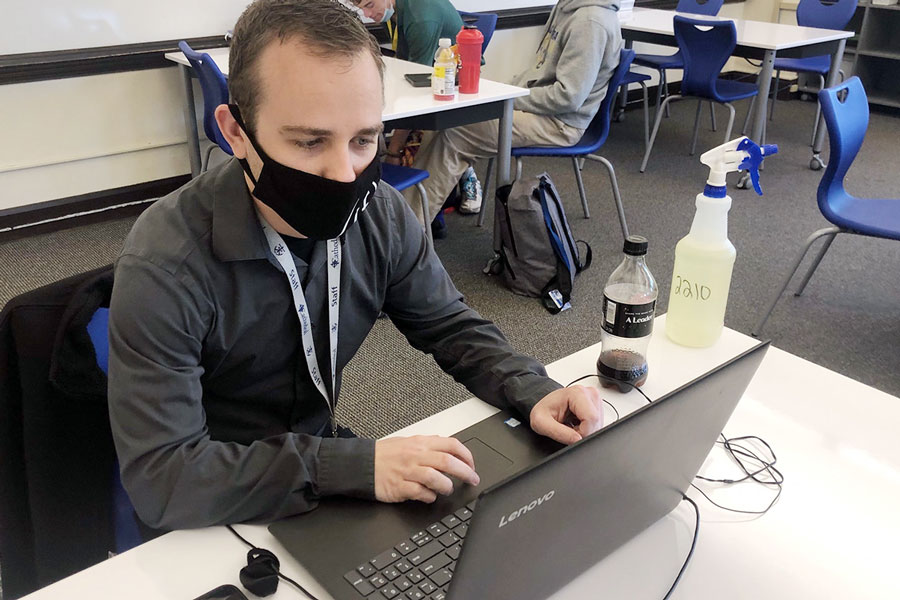Biden’s college loan policy could affect seniors
Social studies teacher notes changes due to new administration
Mr. Parker Leisure works at his desk in the Learning Commons during E period on May 5.
The decisions are in. Almost every member of the Class of 2021, save for a few who are pursuing a gap year, have made their college decision.
Now they and their parents have to figure out how to pay for the next four years.
As with most all valued things, college comes at a price, and with each passing year tuition fees seem to increase, bringing a burden on many students and impacting college decisions and choices that are huge factors in a college hopeful’s life.
Just as many middle schoolers struggle with high school decisions based off of their financial standing, most all graduating high school students count tuition as one of the deciding factors in their college decisions. Some students miss out on the opportunity to attend their dream schools or universities that fit them well, not because of their merit, but because of the financial pressure it would place on them and their family.
Despite all the work that the colleges and other non-profit organizations do to financially aid students, students are forced to either attend less expensive schools, and even then in many cases these students still take out student loans. The collegiate Class of 2019 had 69% of its students graduate with some form or level of student loans, with the average student owing around $30,000 in debt.
The Biden administration has been looking to aid the students and their loans since President Joe Biden and Vice President Kamala Harris stepped into the Oval Office. Many prominent Democratic politicians, such as Massachusetts Sen. Elizabeth Warren, have made a move to persuade Biden into aiding $50,000 in student debt per college student, which would essentially end college loans for 80% of the 45 million current or former students who have chosen that route.
One of Biden’s notable movements in his campaign was the push to aid student loans, but the Democrats are encouraging Biden to exceed the $10,000 of aid per student that he backed during his presidential campaign. Many believe that Biden will support the movement, as his fellow Democrats have been pushing him to use his executive authority to make it a reality, but for now, the administration has been awaiting legal review on whether or not the administration has the ability to cancel student loans with the help of the Education Department.
Government teacher Mr. Craig Blanchet has followed the messaging between the President and the Democrats and has been watching it with anticipation. “I believe prior to the next 2024 presidential election there will be some legislative package that includes substantial college loan debt forgiveness,” Blanchet wrote in an email, but he added that he doesn’t think the change will be more than a “momentary blip” in the relief for students with debt, and that a longer term stand is needed.
Mr. Parker Leisure, who directs the Learning Commons in Loretto Hall, also remarked on how the debt is a short term change that will come back around in the end. Leisure said, “It will be helpful, but ultimately someone is paying for that, it’s not exactly ‘free’ college; whether that’s the government and random stimulus packages, or taxpayers and numerous grants, whatever it is, someone’s has to make up that deficit.”
Blanchet pointed out that colleges and universities force students into taking large loans to get into their desired college. The government teacher added, “At the back end the job market often falls well short of allowing them to repay their debts while living a reasonable lifestyle.”
What leads to real and necessary change is the need to turn the tables for college students and the colleges themselves, Blanchet believes. He said he envisions a process where students are sought after by colleges and universities, rather than a process that involves students reaching out and begging for the chance to attend a university that will leave them with thousands in debt four years later. “Students should demand more guarantees from their colleges at the end of their investment,” Blanchet wrote, adding that the turning of the tables would make it easier for students to thrive post-college.
Leisure, a recent graduate of IUPUI, noted how education systems should be held accountable if, as he said, “they aren’t giving you the right tools to succeed in those fields,” adding that it’s up to the students to demand more, a demand that can start with this current senior class.
There are options out there for students to demand more, as Blanchet and Leisure both detailed. As for the loan forgiveness, Leisure commented on how he could see the government rolling out those packages with two-year schools and community colleges first, as he said, to test the waters.

Luke Hern is a senior opinion editor for the Megaphone. He is a member of the men’s soccer and basketball teams and the National Honors Society, and...

Ashlynn Bakemeyer is a senior and the co-editor-in-chief of the Megaphone. At Cathedral she is involved in the Best Buddies Club. Outside of school she...







